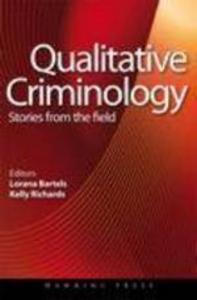Criminological research and the search for meaning: some reflections on praxis
Cunneen, Chris (2011) Criminological research and the search for meaning: some reflections on praxis. In: Bartels, Lorana, and Richards, Kelly, (eds.) Qualitative Criminology: stories from the field. Hawkins Press , Sydney, NSW, Australia, pp. 167-178.
![[img]](https://researchonline.jcu.edu.au/15985/2.hassmallThumbnailVersion/15985_Cunneen_2011_Book_Cover.jpg)
|
Image (JPEG) (Book Cover)
- Cover Image
Download (6kB) |
|
|
PDF (Published Version)
- Published Version
Restricted to Repository staff only |
Abstract
[Extract] Writing this chapter has allowed and indeed required a reflective contemplation of the process of doing research, which is rarely available in the day-to-day world of both academic and professional research. Deciding upon a methodological approach is inevitably constrained by the time available to put in a submission, tender or grant application, the time available to do the research, the amount of money and other resources available to conduct the research, the likelihood of ethics approval for particular methods, the political dynamics surrounding the research and so on. Rarely are we afforded the opportunity to examine our own assumptions about the value of particular research methods. The fact that we would choose qualitative research methods probably reflects in the first instance our own training as much as any other decision about a preferred methodological approach.
At the broadest level, our political and intellectual backgrounds are likely to shape the selection of subject matter for research, as well as how we go about doing it. However, these influences are not always straightforward. For example, the theoretical directions and approaches that might constitute critical criminology are very diverse, and vary from Marxism to postcolonial theory, from feminism to abolitionism. Even within a particular arena of committed political scholarship, such as feminism, there is no single methodology, but rather what has been described as an adherence to a range of methodological preferences that reflect concerns related to gender-based knowledge and power (Mason and Stubbs, 2011; Chapter 13). In the spirit of reflecting upon the guiding assumptions that underpin research methodologies, I begin this chapter by acknowledging some of the major influences that have directed the way I have thought about the process of doing research and the meaning we might attach to particular methodologies.
| Item ID: | 15985 |
|---|---|
| Item Type: | Book Chapter (Research - B1) |
| ISBN: | 978-1-87606-724-3 |
| Keywords: | criminology; criminal justice |
| Date Deposited: | 01 Aug 2011 03:56 |
| FoR Codes: | 16 STUDIES IN HUMAN SOCIETY > 1602 Criminology > 160204 Criminological Theories @ 100% |
| SEO Codes: | 94 LAW, POLITICS AND COMMUNITY SERVICES > 9404 Justice and the Law > 940499 Justice and the Law not elsewhere classified @ 100% |
| Downloads: |
Total: 383 Last 12 Months: 4 |
| More Statistics |



